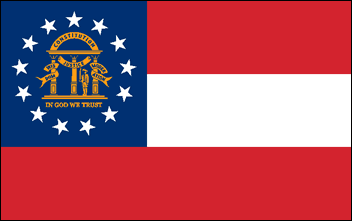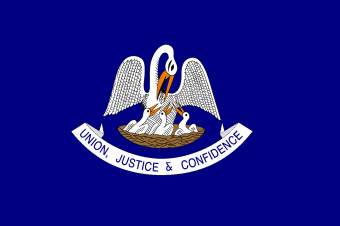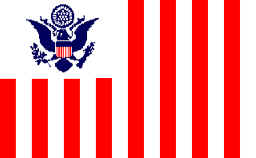| The Flags of the Several united States |
| State Homepage | State Information | State Flag & Statute |
|---|
| ALABAMA |
Home of the Alibamon Indians of the Creek confederacy.
First European Permanent Settlement: 1702;
Capitol: Montgomery;
Statehood: December 14, 1819; Order - 22nd;
Seceded: January 11, 1861 (4th of 11 states);
Readmission: June 25, 1868 (3rd of 11 states);
National Representatives: 7 seats;
Electoral Votes: 9 |  |
| ALASKA |
The Russians adopted the word meaning "great lands" or "land that is not an island" from the Aleutian word alakshak.
First European Permanent Settlement: 1784;
Capitol: Juneau 19,528. 1980 pop;
Administrative Divisions: 23 Divisions;
Statehood: January 3, 1959; Order - 49th;
National Representatives: 1 seat;
Electoral Votes: 3
|  |
| ARIZONA |
The Spanish coined the name either from the Pima Indian word meaning "little spring" or from the Aztec arizuma, meaning "silver-bearing."
First European Permanent Settlement: 1776;
Capitol: Phoenix 894,070. 1986 Pop. - Rank 10;
Administrative Divisions: 15 Counties;
Statehood: February 14, 1912; Order - 48th;
National Representatives: 5 seats;
Electoral Votes: 7
|  |
| ARKANSAS |
Once the territory of the Siouan Quapaw (down-stream
people), Arkansas is the French derivative of this Indian name.
First European Permanent Settlement: 1686;
Capitol: Little Rock 181,030. 1986 Pop. - Rank 86;
Administrative Divisions: 75 Counties;
Statehood: June 15, 1836; Order - 25th;
Seceded: May 6, 1861 (9th of 11 States);
Readmission: June 22, 1868. (2nd of 11 States);
National Representatives: 4 seats;
Electoral Votes: 6
|  |
| CALIFORNIA |
The name of a fictitious earthly paradise in Las Serged de Esplandian, a sixteenth-century Spanish romance. It is believed that Spanish conquistadors
named this state.
First European Permanent Settlement: 1769;
Capitol: Sacramento 323,550. 1986 Pop. - Rank 49;
Administrative Divisions: 58 Counties;
Statehood: September 9, 1850; Order - 31st;
National Representatives: 45 Seats;
Electoral Votes: 47
|  |
| COLORADO |
A Spanish word for "red" The name Colorado first referred to the Colorado River.
First European Permanent Settlement: 1858;
Capitol: Denver 505,000. 1986 Pop. - Rank 23;
Administrative Divisions: 63 Counties;
Statehood: August 1, 1876; Order - 38th;
National Representatives: 6 seats;
Electoral Votes: 8
|  |
| CONNECTICUT |
The Algonquin and Mohican Indian word for "long river place."
First European Permanent Settlement: 1634;
Capitol: Hartford 136,392. 1980 Pop;
Administrative Divisions: 8 Counties;
Statehood: January 9, 1788 (Fifth of the 13 original States.);
National Representatives: 6 seats;
Electoral Votes: 8
|  |
| DELAWARE |
This version of the name of Lord De La Warr, a governor of Virginia, was first used to name the Delaware River and later adopted by the Europeans to rename the local Indians, originally called the Lenni-Lenape.
First European Permanent Settlement: 1638;
Capitol: Dover 23,507. 1980 Pop;
Administrative Divisions: 3 Counties;
Statehood: December 7, 1787. (First of the 13 original States.);
National Representatives: 1 seat;
Electoral Votes: 3
|  |
| FLORIDA |
In his search for the "Fountain of Youth," Ponce de Leon named this region "flowery Easter" or "feast of flowers" on Easter Sunday, 1513.
First European Permanent Settlement: 1565;
Capitol: Tallahassee 81,548. 1980 Pop;
Administrative Divisions: 67 Counties;
Statehood: March 3, 1845; Order - 27th;
Seceded: January 10, 1861 (3rd of 11 states);
Readmission: June 25, 1868 (4th of 11 states);
National Representatives: 19 seats;
Electoral Votes: 21
|  |
| GEORGIA |
Named for King George II of England, who granted James Oglethorpe a charter to found the colony of Georgia in 1732.
First European Permanent Settlement: 1733;
Capitol: Atlanta 421,910. 1986 Pop. - Rank 32;
Administrative Divisions: 159 Counties;
Statehood: January 2, 1788 (4th of the 13 original States);
Seceded: January 19, 1861 (5th of 11 states);
Readmission: June 25, 1868 (5th of 11 states);
- readmitted a second time July 15, 1870;
National Representatives: 10 seats;
Electoral Votes: 12
|  |
| HAWAII |
Commonly believed to be an English adaptation of the native word for "homeland," hawaiki or owhyhee.
First European Permanent Settlement: 1820;
Capitol: Honolulu 372,330. 1986 Pop. - Rank 38;
Administrative Divisions: 4 Counties;
Statehood: August 21, 1959; Order - 50th;
National Representatives: 2 seats;
Electoral Votes: 4
|  |
| IDAHO |
A name coined by the state meaning "gem of the mountains" or "light on the mountains." Originally the name Idaho was to be used for the Pike's Peak mining territory in Colorado, and later for the mining territory of the Pacific Northwest. Others believe the name derives from the Kiowa Apache word for the Comanche.
First European Permanent Settlement: 1842;
Capitol: Boise City 102,249. 1980 Pop;
Administrative Divisions: 44 Counties;
Statehood: July 3, 1890; Order - 43rd;
National Representatives: 2 seats;
Electoral Votes: 4
|  |
| ILLINOIS |
From the French version of the Alonquin word meaning "men" or "soldiers" Illini.
First European Permanent Settlement: 1720;
Capitol: Springfield 100,054. 1980 Pop;
Administrative Divisions: 102 Counties;
Statehood: December 3, 1818; Order - 21st;
National Representatives: 22 seats;
Electoral Votes: 24
|  |
| INDIANA |
"Land of the Indians" The name was coined in 1800 when Congress carved the new state of Ohio from the Northwest Territory, and designated the remaining
area as the Indiana Territory. The territorial name was retained when Indiana became a state in 1816.
First European Permanent Settlement: 1733;
Capitol: Indianapolis 719,620. 1986 Pop. - Rank 13;
Administrative Divisions: 92 Counties;
Statehood: December 11, 1816; Order - 19th;
National Representatives: 10 seats;
Electoral Votes: 12 |  |
| IOWA |
The Sioux word for "one who puts to sleep" or "beautiful land."
First European Permanent Settlement: 1788;
Capitol: Des Moines 192,060. 1986 Pop - Rank 78;
Administrative Divisions: 99 Counties;
Statehood: December 28, 1846; Order - 29th;
National Representatives: 6 seats;
Electoral Votes: 8
|  |
| KANSAS |
Derived from the Sioux word for those who lived south (the "south wind people") of their territory, which was mainly Wisconsin, Iowa, Minnesota, North Dakota
and South Dakota.
First European Permanent Settlement: 1727;
Capitol: Topeka 118,690. 1980 Pop;
Administrative Divisions: 105 Counties;
Statehood: January 29, 1861; Order - 34th;
National Representatives: 5 seats;
Electoral Votes: 7
|  |
| KENTUCKY |
Originally the term for the Kentucky plains in Clark County, Kentucky is believed to derive from the Indian word meaning "dark and bloody ground", "meadow land," or "land of tomorrow."
First European Permanent Settlement: 1774;
Capitol: Frankfort 25,973. 1980 Pop;
Administrative Divisions: 120 Counties;
Statehood: June 1, 1792; Order - 15th;
National Representatives: 7 seats;
Electoral Votes: 9 |  |
| LOUISIANA |
Present-day Louisiana is just a fraction of the territory that was named for the French King Louis XIV by Sieur de La Salle.
First European Permanent Settlement: 1699
Capitol: Baton Rouge 241,130. 1986 Pop. - Rank 62;
Administrative Divisions: 64 Parishes;
Statehood: April 30, 1812; Order - 18th;
Seceded: January 26, 1861;
Readmission: June 25, 1868;
National Representatives: 8 seats;
Electoral Votes: 10
|  |
| MAINE |
Originally a French territory, Maine was the ancient French word for "province." It is also believed that it refers to the mainland, as distinct from the many
islands off the state's coast.
First European Permanent Settlement: 1624;
Capitol: Augusta 21,819. 1980 Pop;
Administrative Divisions: 16 Counties;
Statehood: March 15, 1820; Order - 23rd;
National Representatives: 2 seats;
Electoral Votes: 4 |  |
| MARYLAND |
Named for Queen Henrietta Maria, wife of Charles I of England.
First European Permanent Settlement: 1634;
Capitol: Annapolis 31,740. 1980 Pop;
Administrative Divisions: 23 Counties; 1 Independent city;
Statehood: April 28, 1788 (Seventh of the 13 original States.);
National Representatives: 8 seats;
Electoral Votes: 10
|  |
| MASSACHUSETTS |
The name of the Indian tribe that lived near Milton, Massachusetts, meaning "large hill place."
First European Permanent Settlement: 1620;
Capitol: Boston 573,600. 1986 Pop. - Rank 19;
Administrative Divisions: 14 Counties;
Statehood: February 6, 1788 (Sixth of the 13 original States.);
National Representatives: 11 seats;
Electoral Votes: 13 |  |
| MICHIGAN |
Believed to be from the Chippewa word micigama, meaning "great water," after Lake Michigan, although Alouet defined it in 1672 as designating a clearing.
First European Permanent Settlement: 1668;
Capitol: Lansing 130,414. 1980 Pop;
Administrative Divisions: 83 Counties;
Statehood: January 26, 1837; Order - 26th;
National Representatives: 18 seats;
Electoral Votes: 20
|  |
| MINNESOTA |
Named from the Sioux description of the Minnesota River, "sky-tinted water" or "muddy water."
First European Permanent Settlement: 1805;
Capitol: Saint Paul 263,680. 1986 Pop. - Rank 59;
Administrative Divisions: 87 Counties;
Statehood: May 11, 1858; Order - 32nd;
National Representatives: 8 seats;
Electoral Votes: 10
|  |
| MISSISSIPPI |
Most likely derived from the Chippewa words mici (great) and zibi (river), it was first written by La Salle's lieutenant Henri de Tonti as "Michi Sepe."
First European Permanent Settlement: 1699;
Capitol: Jackson 208,420. 1986 Pop. - Rank 74;
Administrative Divisions: 82 Counties;
Statehood: December 10, 1817; Order - 20th;
Seceded: January 9, 1861 (4th of 11 states);
Readmission: February 23, 1870 (10th of 11 states);
National Representatives: 5 seats;
Electoral Votes: 7
|  |
| MISSOURI |
Meaning "muddy water," this state is named after an Algonquin Indian tribe.
First European Permanent Settlement: 1735;
Capitol: Jefferson City 33,619. 1980 Pop;
Administrative Divisions: 114 Counties; 1 Independent city;
Statehood: August 10, 1821; Order - 24th;
National Representatives: 9 seats;
Electoral Votes: 11 |
 |
| MONTANA |
Derived from the Latin word meaning "mountainous."
First European Permanent Settlement: 1809;
Capitol: Helena 23,938. 1980 Pop;
Administrative Divisions: 56 Counties;
Statehood: November 8, 1889; Order - 41st;
National Representatives: 2 seats;
Electoral Votes: 4
|  |
| NEBRASKA |
Descriptive of the Platte River, Nebraska is from the Omaha or Otos Indian word for "broad water" or "flat river."
First European Permanent Settlement: 1823;
Capitol: Lincoln 183,050. 1986 Pop. - Rank 85;
Administrative Divisions: 93 Counties;
Statehood: March 1, 1867; Order - 37th;
National Representatives: 3 seats;
Electoral Votes: 5
|  |
| NEVADA |
Spanish word meaning "snow clad."
First European Permanent Settlement: 1849;
Capitol: Carson City 32,022. 1980 Pop;
Administrative Divisions: 16 Counties; 1 Independent city;
Statehood: October 31, 1864; Order - 36th;
National Representatives: 2 seats;
Electoral Votes: 4
|  |
| NEW HAMPSHIRE |
Captain John Mason named this colony for his home county in England in 1629.
First European Permanent Settlement: 1623;
Capitol: Concord 30,400. 1980 Pop;
Administrative Divisions: 10 Counties;
Statehood: June 21, 1788 (9th of original 13 states);
National Representatives: 2 seats;
Electoral Votes: 4
|  |
| NEW JERSEY |
Named after the Isle of Jersey in England by John Berkley and Sir George Carteret.
First European Permanent Settlement: 1664;
Capitol: Trenton 92,124. 1980 Pop;
Administrative Divisions: 21 Counties;
Statehood: December 18, 1787 (3rd of original 13 states);
National Representatives: 14 seats;
Electoral Votes: 16
|  |
| NEW MEXICO |
Named by the Spanish for the territory north and west of the Rio Grande.
First European Permanent Settlement: 1610;
Capitol: Santa Fe 49,160. 1980 Pop;
Administrative Divisions: 33 Counties;
Statehood: January 6, 1912; Order - 47th;
National Representatives: 3 seats;
Electoral Votes: 5
|  |
| NEW YORK |
Originally named New Netherland, New York was later
named After the Duke of York and Albany, who received
a patent to the region from his brother Charles II of
England and captured it from the Dutch in 1644.
First European Permanent Settlement: 1614;
Capitol: Albany 101,727. 1980 Pop;
Administrative Divisions: 62 Counties;
Statehood: July 26, 1788 (11th of 13 original states);
National Representatives: 34 seats;
Electoral Votes: 36
|  |
| NORTH CAROLINA |
From the Latin name Carolus, meaning "Charles." The colony was originally given to Sir Robert Heath by Charles I and was to be called Province of Carolana.
Carolana was divided into North and South Carolina in 1710.
First European Permanent Settlement: 1660;
Capitol: Raleigh 180,430. 1986 Pop. - Rank 87;
Administrative Divisions: 100 Counties;
Statehood: November 21, 1789 (12th of original 13 states);
Seceded: May 20, 1861 (10th of 11 states);
Readmission: June 25, 1868 (7th of 11 states);
National Representatives: 11 seats;
Electoral Votes: 13
|  |
| NORTH DAKOTA |
From the Sioux word meaning "friend" or "ally."
First European Permanent Settlement: 1812;
Capitol: Bismarck 44,485. 1980 Pop;
Administrative Divisions: 53 Counties;
Statehood: November 2, 1889; Order - 39th;
National Representatives: 1 seat;
Electoral Votes: 3
|  |
| OHIO |
From an Iroquois Indian word variously meaning "great," "fine," "good river."
First European Permanent Settlement: 1788;
Capitol: Columbus 566,030. 1986 Pop. - Rank 20;
Administrative Divisions: 88 Counties;
Statehood: March 1, 1803; Order - 17th;
National Representatives: 21 seats;
Electoral Votes: 23
| < |
| OKLAHOMA |
From the Choctaw Indian word meaning "red man," which was coined by the Reverend Allen Wright, a Choctaw-speaking Indian.
First European Permanent Settlement: 1889;
Capitol: Oklahoma City 446,120. 1986 Pop. - Rank 28;
Administrative Divisions: 77 Counties;
Statehood: November 16, 1907; Order - 46th;
National Representatives: 6 seats;
Electoral Votes: 8
|  |
| OREGON |
Though its exact origin is unclear, one theory maintains that it may have been a variation on the name of the Wisconsin River, which was called Ouaricon-sint on a French map dated 1715. Later, the English explorer Major Robert Rogers named a river "called by the Indians Ouragon" in his request to seek a Northwest Passage
from the Great Lakes. Another theory derives the word from the Algonquin wauregan, meaning "beautiful water."
First European Permanent Settlement: 1811;
Capitol: Salem 89,091. 1980 Pop;
Administrative Divisions: 36 Counties;
Statehood: February 14, 1859; Order - 33rd;
National Representatives: 5 seats;
Electoral Votes: 7
|  |
| PENNSYLVANIA |
Named after the colony's founder, the Quaker William Penn. The literal translation is "Penn's woods."
First European Permanent Settlement: 1682;
Capitol: Harrisburg 53,264. 1980 Pop;
Administrative Divisions: 67 Counties;
Statehood: December 12, 1787 (2nd of 13 original states);
National Representatives: 23 seats;
Electoral Votes: 25
|  |
| RHODE ISLAND |
Possibly named by Giovanni de Verrazano, who charted an island about the size of an island of the same name in the Mediterranean. Another theory suggests Rhode Island was named Roode Eylandt by Dutch explorer Adrian Block because of its red clay.
First European Permanent Settlement: 1636;
Capitol: Providence 156,804. 1980 Pop;
Administrative Divisions: 5 Counties;
Statehood: May 29, 1790 (13th of 13 original states);
National Representatives: 2 seats;
Electoral Votes: 4
|  |
| SOUTH CAROLINA |
From the Latin name Carolus, meaning "Charles." The colony was originally given to Sir Robert Heath by Charles I and was to be called Province of Carolana. Carolana was divided into North and South Carolina in 1710.
First European Permanent Settlement: 1670;
Capitol: Columbia 101,229. 1980 Pop;
Administrative Divisions: 46 Counties;
Statehood: May 23, 1788 (8th of 13 original states);
Seceded: December 20, 1860 (1st of 11 states);
Readmission: June 25, 1868 (8th of 11 states);
National Representatives: 6 seats;
Electoral Votes: 8
|  |
| SOUTH DAKOTA |
From the Sioux word meaning "friend" or "ally."
First European Permanent Settlement: 1859;
Capitol: Pierre 11,973. 1980 Pop;
Administrative Divisions: 67 Counties;
Statehood: November 2, 1889; Order - 40th;
National Representatives: 1 seat;
Electoral Votes: 3
|  |
| TENNESSEE |
The state of Franklin, or Frankland, from 1784 to 1788, it was finally named after the Cherokee villages called tanasi on the Little Tennessee River.
First European Permanent Settlement: 1769;
Capitol: Nashville - Pop. listed below;
Administrative Divisions: 95 Counties;
Statehood: June 1, 1796; Order - 16th;
Seceded: June 8, 1861 (11th of 11 states);
Readmission: July 24, 1866 (1st of 11 states);
National Representatives: 9 seats;
Electoral Votes: 11
|  |
| TEXAS |
Also written texias, tejas, and teysas, Texas is a variation on the Caddo Indian word for "friend" or "ally."
First European Permanent Settlement: 1682;
Capitol: Austin 466,550. 1986 Pop. - Rank 27;
Administrative Divisions: 254 Counties;
Statehood: December 29, 1845; Order - 28th;
Seceded: February 1, 1861 (7th of 11 states);
Readmission: March 30, 1870 (11th of 11 states);
National Representatives: 27 seats;
Electoral Votes: 29
|  |
| UTAH |
Meaning "upper" or "higher," Utah is derived from a name used by the Navajos (Utes) to designate a Shoshone tribe.
First European Permanent Settlement: 1847;
Capitol: Salt Lake City 163,034. 1980 Pop;
Administrative Divisions: 29 Counties;
Statehood: January 4, 1896; Order - 45th;
National Representatives: 3 seats;
Electoral Votes: 5
|  |
| VERMONT |
It is believed Samuel de Champlain coined the name from the French words vert (green) and mont (mountain). Later, Dr. Thomas Young proposed this name when the
state was formed in 1777.
First European Permanent Settlement: 1724;
Capitol: Montpelier 8,241. 1980 Pop;
Administrative Divisions: 14 Counties;
Statehood: March 4, 1791; Order - 14th;
National Representatives: 1 seat;
Electoral Votes: 3
|  |
| VIRGINIA |
Named for the Virgin Queen of England, Queen Elizabeth I, by Sir Walter Raleigh, who first visited its shores in 1584.
First European Permanent Settlement: 1607;
Capitol: Richmond 217,700. 1986 Pop. - Rank 72;
Administrative Divisions: 95 Counties; 41 Independent cities;
Statehood: June 25, 1788 (10th of 13 original states);
Seceded: April 17, 1861 (8th of 11 states);
Readmission: January 26, 1870 (9th of 11 states);
National Representatives: 10 seats;
Electoral Votes: 12
|  |
| WASHINGTON |
Originally named the territory of Columbia, it was changed to Washington in honor of the first U.S. President because of the already existing District of
Columbia.
First European Permanent Settlement: 1811;
Capitol: Olympia 27,447. 1980 Pop;
Administrative Divisions: 39 Counties;
Statehood: November 11, 1889; Order - 42nd;
National Representatives: 8 seats;
Electoral Votes: 10
|
 |
| WEST VIRGINIA |
Named when this area refused to secede from the Union in 1863.
First European Permanent Settlement: 1727;
Capitol: Charleston 63,968. 1980 Pop;
Administrative Divisions: 55 Counties;
Statehood: June 20, 1863; Order - 35th;
National Representatives: 4 seats;
Electoral Votes: 6
|  |
| WISCONSIN |
A Chippewa/Ojibwa word that was spelled Ouisconsin and Mesconsing by early explorers. Wisconsin was formally named by Congress when it became a state.
First European Permanent Settlement: 1766;
Capitol: Madison 175,830. 1986 Pop. - Rank 92;
Administrative Divisions: 72 Counties;
Statehood: May 29, 1848; Order - 30th;
National Representatives: 9 seats;
Electoral Votes: 11
|  |
| WYOMING |
The Algonquin word meaning "large prairie place," the name was adopted from Wyoming Valley, Pennsylvania, the site of an Indian massacre. It was widely known from Thomas Campbell's poem "Gertrude of Wyoming."
First European Permanent Settlement: 1834;
Capitol: Cheyenne 47,283. 1980 Pop;
Administrative Divisions: 23 Counties;
Statehood: July 10, 1890; Order - 44th;
National Representatives: 1 seat;
Electoral Votes: 3
|  |
|
| The Flags of the Several Territories |
| Territory Homepage | Territory Information | Territory Flag & Statute |
|---|
| AMERICAN SAMOA |
First European Settlement: early 1800s;
Capitol: Pago Pago, Pop 57,366, July 1995;
Unincorporated, Unorganized territory of the US in 1900,
Administered by the US Department of Interior;
National Representatives: None |  |
| GUAM |
First European Settlement: early 1700s;
Capitol: Agana, Pop 153,307 July 1995;
Unincorporated, Organized territory of the US
Administered by the US Department of Interior
National Representatives: 1
|  |
| PUERTO RICO |
First European Permanent Settlement: 1493;
Capitol: San Juan 47,283. 1980 Pop;
Commonweatlth associated with the United States;
Constitution: ratified 3 March 1952; approved by U.S. Congress 3 July 1952; effective 25 July 1952.
National Representatives: 1 seat, no vote;
|  |
| VIRGIN ISLANDS |
First European Permanent Settlement: 1666;
Capitol: Charlotte Amalie (St. Thomas); Pop 97,229 July 1995;
Unincorporated, Organized territory of the US
Administered by the US Department of Interior
National Representatives: 1 seat, no vote;
|  |

























































